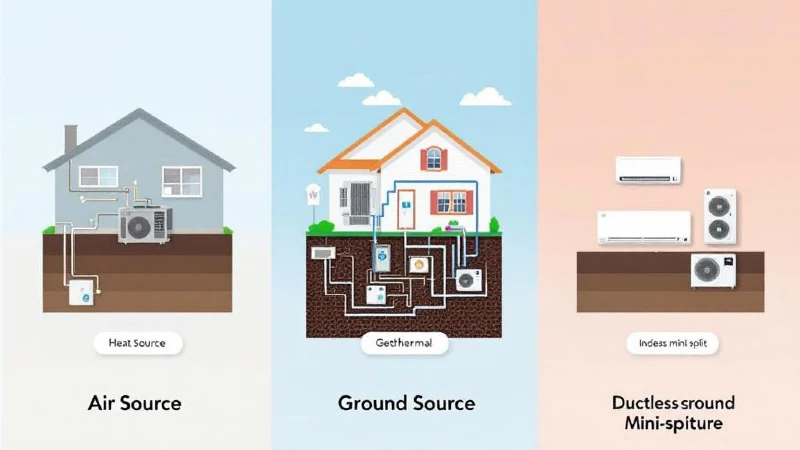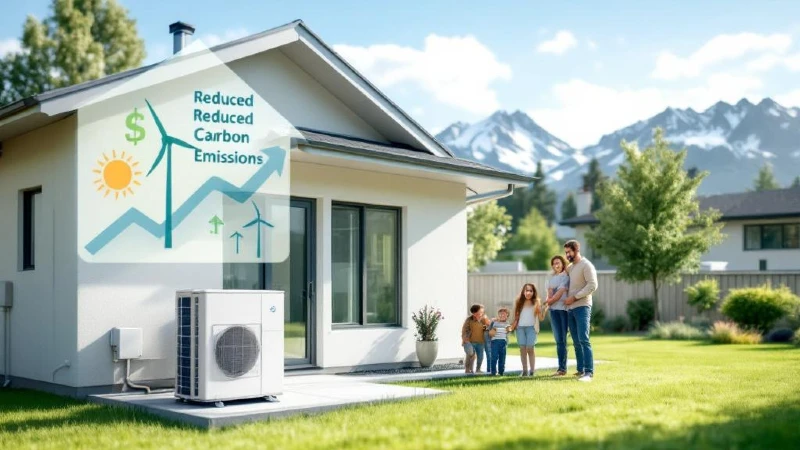Heat Pumps: Most Efficient Way to Heat Your Home
The Most Efficient Way to Heat a Home
Heat pumps are the most efficient way to heat your home. Unlike traditional heating systems that generate heat, heat pumps move heat from one place to another, making them highly energy-efficient. This means they can provide both heating in winter and cooling in summer, using less energy than separate systems. For homeowners in Salt Lake City, heat pumps offer a cost-effective solution that ensures comfort all year while lowering utility bills. They are also eco-friendly, as they produce more heat energy than the electricity they consume.
This guide will explain how heat pumps work, the different types available, their efficiency, costs, and maintenance. Whether you’re looking for electric heating systems for your home, a gas-free heating option, or the most cost-effective way to heat your house, heat pumps are a smart choice. We’ll also share tips to maximize their performance. To learn more about how Ninja HVAC can assist you with heat pumps, visit our Heat Pump Services page.
Understanding Heat Pump Operation
A heat pump is an electric device that moves heat from one place to another, rather than generating it. Think of it as a refrigerator working in reverse. In heating mode, it extracts heat from the outdoor air—even in cold temperatures—and transfers it inside to warm your home. In cooling mode, it removes heat from your home and releases it outside, functioning as an air conditioner. This dual functionality makes heat pumps a versatile choice for year-round comfort.
The process relies on a refrigerant that absorbs and releases heat as it circulates through the system. Key components include an outdoor unit, an indoor unit, and a compressor that facilitates heat transfer. This method of moving heat is what sets heat pumps apart from traditional heating systems, making them highly efficient.
Why Heat Pumps Are the Most Efficient Way to Heat Your Home
Heat pumps are considered the most efficient type of electric heat because they deliver more heat energy than the electricity they consume. According to the U.S. Department of Energy, heat pumps can reduce electricity use for heating by up to 75% compared to electric resistance heaters (DOE). This efficiency is measured by two key metrics:
-
Heating Seasonal Performance Factor (HSPF2): Indicates heating efficiency over a season, with higher ratings (e.g., 10) showing better performance.
-
Seasonal Energy Efficiency Ratio (SEER2): Measures cooling efficiency, with ratings above 15 indicating high efficiency.
For comparison, gas furnaces have efficiencies of 80% to 98%, losing 10% to 20% of energy as waste due to combustion. Heat pumps, however, can provide 2 to 3 times more heat energy than the electricity they use, with a Coefficient of Performance (COP) of 2-3. This makes them a standout option for those seeking the most cost-effective way to heat a house.
|
Heating System |
Efficiency |
Energy Loss |
Emissions |
|---|---|---|---|
|
Gas Furnace |
80–98% | 10–20% |
Yes |
|
Electric Resistance Heater |
100% (but high energy use) |
None |
No |
|
Heat Pump |
200–300% (2–3x energy output) |
Minimal |
No |
Types of Heat Pumps
Heat pumps come in several types, each offering smart heating systems and efficient heating solutions for different homes:
-
Air-Source Heat Pumps: These extract heat from outdoor air and are common in homes with ductwork. They consist of an outdoor unit and an indoor unit connected by refrigerant lines. With HSPF2 ratings of 8-12, they are suitable for moderate climates like Salt Lake City.
-
Ground-Source (Geothermal) Heat Pumps: These use the stable ground or groundwater temperature as a heat source, with a buried loop system. They have HSPF2 ratings often exceeding 30, making them the most efficient type, though they require higher upfront costs.
-
Ductless Mini-Split Heat Pumps: Ideal for homes without ductwork, these systems consist of an outdoor compressor and indoor units for zoned heating and cooling. They offer SEER2 ratings above 20 and HSPF2 above 10, providing flexibility.
Choosing the right type depends on your home’s layout, climate, and budget. For example, ductless mini-splits are great for older homes, while geothermal systems suit those prioritizing long-term savings.
Benefits of Heat Pumps
Heat pumps offer several advantages that make them appealing for modern homeowners:
-
Energy Savings: By using less electricity, heat pumps lower utility bills, aligning with the goal of finding the most cost-effective way to heat a house.
-
Environmental Benefits: As electric heating systems for homes, heat pumps produce no emissions during operation, making them a heating system without gas that reduces reliance on fossil fuels.
-
Year-Round Comfort: Their ability to both heat and cool eliminates the need for separate systems, simplifying home climate control.
-
Improved Air Quality: Unlike furnaces, which burn fuel and can release pollutants, heat pumps move heat, contributing to cleaner indoor air.
Heat Pumps in Different Climates
One common concern is whether heat pumps work in cold climates. The answer is yes—modern heat pumps are designed to operate efficiently even in low temperatures. Advanced air-source heat pumps can extract heat from air as cold as -15°F, thanks to variable-speed compressors and advanced refrigerants. In colder regions like Utah, dual fuel systems combine a heat pump with a gas furnace. This setup uses the heat pump’s efficiency during milder weather and switches to the furnace during extreme cold, offering the best efficiency home comfort solution available.
A heat pump efficiency chart illustrates performance:
|
Temperature |
HSPF2 Rating |
|---|---|
|
47°F |
~10 |
|
17°F |
~6 |
Comparing Heat Pumps to Other Systems
To understand why heat pumps are the most efficient way to heat your house, let’s compare them to other systems:
-
Heat Pump vs. Furnace: Furnaces burn fuel, producing emissions and losing efficiency due to waste. Heat pumps move heat, saving energy and reducing environmental impact. For example, a gas furnace vs. heat pump comparison shows heat pumps deliver more heat per energy unit.
-
Heat Pump vs. Air Conditioner: Air conditioners only cool, while heat pumps provide both heating and cooling, making them more versatile. Heat pump cooling efficiency often matches or exceeds that of air conditioners.
-
Heat Pump vs. Electric Heat: Heat pumps outperform electric resistance heaters, which are 100% efficient but don’t exceed input energy.
-
Heat Pump vs. Conventional HVAC: Traditional forced-air systems, like gas furnaces with ductwork, are less efficient than heat pumps.
Common Questions
Here are answers to frequently asked questions to clarify how heat pumps work:
-
Does a heat pump cool and heat? Yes, it provides both heating and cooling, eliminating the need for separate systems.
-
Does a heat pump provide air conditioning? Absolutely, it offers efficient cooling alongside heating.
-
Does a heat pump use water? Typically, no. Air-source and ductless mini-split heat pumps use air, while geothermal systems may use water in closed loops, but this is contained.
-
What’s the most efficient way to heat a house? Heat pumps are widely regarded as the most efficient, especially when powered by renewable electricity.
Energy-Efficient Heating
Heat pumps are a cornerstone of energy-efficient heating, reducing electricity consumption and lowering utility bills. Their high efficiency translates to long-term savings, with studies showing 30-50% reductions in heating costs compared to electric resistance heaters and up to 20% versus gas furnaces (Energy Star). This makes them a financially savvy choice for homeowners.
Eco-Friendly Heating Options
Heat pumps are among the most eco-friendly heating options available. By avoiding combustion, they produce no direct emissions, especially when paired with renewable energy sources like solar or wind power. Compared to other green solutions, such as biomass boilers or solar thermal systems, heat pumps are more versatile and easier to install in existing homes.
Heat Pump Installation Cost
The cost of heat pump installation varies by type:
|
Type |
Cost Range |
|---|---|
|
Air-Source Heat Pumps |
$9,500–$25,000 |
|
Ductless Mini-Splits |
$3,000–$5,000 per zone |
|
Geothermal Heat Pumps |
$10,000–$30,000 |
Installation costs include equipment, labor, and electrical upgrades. Despite higher upfront costs, heat pumps are cost-effective due to lower operating costs. Incentives like federal tax credits (up to $2,000 via the Energy Efficient Home Improvement Credit) and utility rebates (e.g., up to $1,450 from Rocky Mountain Power) can offset expenses.
Best Heat Pumps for Cold Climates
In cold climates, selecting the right heat pump is crucial. Brands like Goodman and Amana offer models with high HSPF2 ratings and variable-speed compressors, ensuring performance in temperatures as low as -15°F. Dual fuel systems are particularly effective, combining heat pump efficiency with gas furnace reliability. For example, in Utah, these systems switch to gas during extreme cold, maintaining comfort and savings.
How Do Heat Pumps Work in Winter?
Heat pumps work in winter by extracting heat from outdoor air, even in sub-zero temperatures. Modern models use advanced refrigerants and defrost cycles to prevent ice buildup on outdoor units. Settings for winter include maintaining consistent temperatures and using smart thermostats to optimize performance. Electricity consumption typically ranges from 1-3 kWh per hour, lower than electric furnaces.
Maintenance Tips
Regular maintenance ensures heat pump efficiency and longevity:
-
Change filters every 1-3 months.
-
Clean coils annually to maintain heat transfer.
-
Check refrigerant levels for leaks.
-
Inspect electrical connections for safety.
Common issues, like inadequate heating or unusual noises, can often be resolved with professional service. Regular maintenance can extend a heat pump’s lifespan to 15-20 years.
Comparing Heat Pumps and Furnaces
A detailed comparison of heat pumps and furnaces highlights their differences:
|
Feature |
Heat Pump |
Gas Furnace |
|---|---|---|
|
Efficiency |
200–300% (COP 2-3) |
80–98% (AFUE) |
|
Emissions |
None (electric) |
Yes (combustion) |
|
Versatility |
Heats and cools |
Heats only |
|
Operating Cost |
Lower (less electricity) |
Higher (fuel costs) |
Heat pumps are more efficient and versatile, while furnaces may be preferred in extremely cold climates without dual fuel options.
Are Heat Pumps Worth It?
Heat pumps are worth the investment for most homeowners due to their energy savings, environmental benefits, and versatility. The initial cost is offset by lower utility bills and incentives. For example, a homeowner in Salt Lake City could save $500 annually on heating costs compared to electric resistance heaters.
Government Incentives
Incentives make heat pumps more affordable:
-
Federal Tax Credits: Up to $2,000 (IRS).
-
Utility Rebates: Up to $1,450 from Rocky Mountain Power.
-
State Rebates: Up to $5,000 in Utah starting late 2025 (Utah Energy Office).
These incentives reduce the financial barrier, making heat pumps a cost-effective choice.
Technology Advancements
Recent advancements in heat pump technology include:
-
Variable-Speed Compressors: Adjust output for optimal efficiency.
-
Advanced Refrigerants: Improve performance in extreme temperatures.
-
Smart Thermostats: Allow remote control and energy monitoring.
-
Wi-Fi-Enabled Systems: Enhance user convenience and system diagnostics.
Brands like Goodman and Amana incorporate these features, making their models some of the most efficient heat pumps available.
Choosing the Right Heat Pump
Selecting a heat pump involves considering:
-
Climate: High HSPF2 models or dual fuel systems for cold climates.
-
Home Size: Proper sizing ensures efficiency.
-
Budget: ENERGY STAR models offer savings.
-
Features: Smart heating systems with Wi-Fi and variable-speed compressors.
Replacing a gas furnace with a heat pump is viable, especially with dual fuel setups. Home heating tips include regular maintenance, proper insulation, and smart thermostats to maximize efficiency.
Conclusion
Heat pumps are likely the most efficient way to heat your home, offering energy-saving heating, eco-friendly heating, and cost-effective heating. With smart heating systems and efficient heating solutions, they provide versatility and savings for homes in Salt Lake City and beyond. Their ability to reduce emissions, lower utility bills, and provide year-round comfort makes them a smart choice for modern homeowners.


